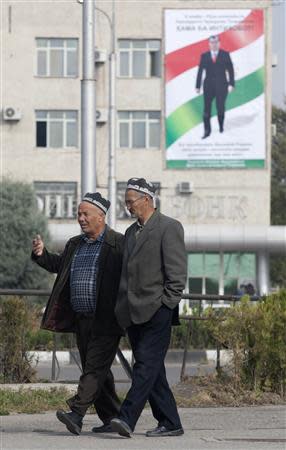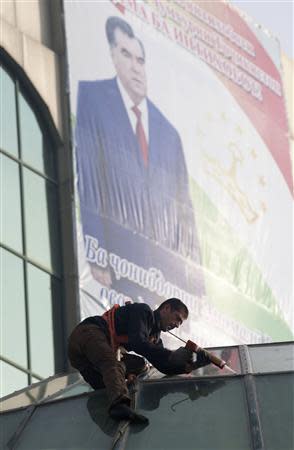Tajik leader to extend two-decade rule despite economic woes
By Roman Kozhevnikov DUSHANBE (Reuters) - Jubilant Tajiks greet their president with rose petals, songs and poetry and pledge oaths of eternal loyalty to a man they call "God's shadow" as he arrives to open a stadium in his impoverished Central Asian nation. The adoring welcome for Imomali Rakhmon at the carefully choreographed event underscores his tight grip over a state he has ruled for more than two decades and which he looks set to dominate for a further seven years after an election on November 6. No opposition candidates have been allowed to run against the former state farm boss, but he faces daunting economic and social problems in his next term as well as possible security woes when NATO troops quit neighboring Afghanistan in 2014. "Rakhmon's landslide victory is not in doubt but many other questions arise," said political analyst Jamshed Kadyrov. "Will Rakhmon replace his current team, which is extremely unpopular? Will he finally launch a tough attack on regional crime and corruption, which is flourishing in Tajikistan?" Nearly half of the former Soviet republic's eight million people live below the poverty line, World Bank figures show, and remittances from around one million Tajiks working in Russia account for some 40 percent of gross domestic product. "My three sons work in Russia. They send back home $300 to $500 every month, often more. As long as Russia gives us jobs, let Rakhmon rule," said a 60-year-old taxi driver who gave his name only as Akhmadjon in the capital Dushanbe. Tajiks, whose average monthly wage is $135, face regular power blackouts during the harsh winters and many homes have been without gas supplies for years. Rakhmon's government, reliant on Russia for energy imports, has just imposed curbs on electricity use in much of the mountainous country outside the main cities. In Dushanbe, glitzy business centers built under Rakhmon stand half-empty, underlining a lack of investor interest. Aluminium exports, a key currency earner, have been falling. Despite such problems, aides say Rakhmon does not need to run an election campaign as "he is busy serving the state". Compliant state media give blanket coverage of his trips around the country inaugurating new schools, hospitals, hotels and stadiums like the one at Kulyab in southern Tajikistan. "Today citizens of our dear country rejoice that... the government is paying special attention to... improving living standards of the population," state-run Khovar news agency quoted him saying at the opening ceremony of the stadium. CRACKDOWN Tajik state media lionizes Rakhmon for bringing stability after his Russian-backed forces defeated Islamist militants in a 1992-97 civil war in which tens of thousands of people died. But critics accuse Rakhmon, 61 and a father of nine, of building a personality cult and stifling freedom of speech. The five other candidates on the ballot are little-known and all of them praise Rakhmon's rule. An opposition human rights activist, Oynihol Bobonazarova, failed to collect the 210,000 signatures required to run for president. Human Rights Watch, a New York-based watchdog, said her supporters had been intimidated by the authorities when they tried to collect signatures. "Over the last year, authorities have widened a crackdown on the political opposition and activists, imprisoning or intimidating several opposition party leaders and stepping up efforts to extradite political opponents from abroad," it said. Rakhmon has also clamped down on what he sees as Islamic extremism in Tajikistan, banning Muslim women's head dress in educational and government institutions and ordering the return of thousands of young Tajiks from religious schools abroad. Despite the relative political calm, tensions still sometimes bubble to the surface. Last year, Rakhmon sent troops to quell rebels in the restive eastern Gorno-Badakhshan region. On the geopolitical front, after a year of bargaining with Moscow, Tajikistan has ratified a deal to extend by three decades Russia's lease on a military base on Tajik territory, which may face future security threats from Afghanistan. Senior Tajik officials say ratification followed Moscow's agreement not to impose tougher terms on the Tajik migrants working in Russia and to ensure duty-free exports to Tajikistan of 1 million tonnes of Russian oil products a year. (Writing by Dmitry Solovyov, editing by Gareth Jones)



